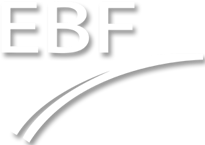
Focus Workshop Slides 2018 September
Program of EBF Focus Workshop “Today’s challenges and solutions in assessing immunogenicity in patients”
September 19-20, 2018
PDF renditions of the powerpoint presentations given at the Focus Workshop can be viewed and downloaded from this page. The program itself can be viewed and downloaded by clicking here
| 19/sep/2018 | |
| 08.45 – 09.00 | Welcome and aim of the meeting |
| 09:00 – 12.30 | Harmonized approaches for immunogenicity method validation |
| 09:00 – 09:25 | Introduction to the session – Overview of current global regulations |
| Jo Goodman, on behalf of the EBF | |
| 09:25 – 09:50 | Harmonisation of immunogenicity testing : The EU perspective |
| Meenu Wadhwa (National Institute for Biological Standards and Control) | |
| 09:50 – 10:10 | Case Study: Request for a full tiered approach assay validation for a well-known drug used for a new indication – when clinical experience was not sufficient |
| Anna Laurén, Wieslab/Eurodiagnostics |
|
| 10:10 – 10:50 | Coffee break & networking |
| 10:50 – 11:10 | Analytical scientists and the statisticians collaborate to make the right decision for cut-points (slides are not available) |
| Alexandra Hawes, LGC | |
| 11:10 – 11:30 | Practical solutions to outlier decisions, pre-existing and treatment-boosted ADA and low biological variability |
| Viswanath Devanarayan, Charles River | |
| 11:30 – 11:50 | Experiences with different cut-point approaches in clinical immunogenicity testing |
| Szilard Kamondi, Roche | |
| 11:50 – 12:30 | Panel discussion |
| Moderator: Robert Nelson. Panelists: Viswanath Devanarayan, Jo Goodman, Meenu Wadha, FDA representative (approval pending) |
|
| 12:30 – 13:40 | Lunch |
| 13:40 – 15:00 | Harmonized approaches for immunogenicity method validation – cntd |
| 13:40 – 14:00 | Effect of different approaches on perceived assay sensitivity and drug tolerance – sense and nonsense of positive controls |
| David Egging, Synthon Biopharmaceuticals BV | |
| 14:00 – 14:20 | Feedback on EBF immunogenicity harmonisation activities |
| Jo Goodman, on behalf of EBF | |
| 14:20 – 14:40 | AAPS-sponsored ADA Validation Testing and Reporting Harmonization |
| Meina Liang, on behalf of the AAPS community | |
| 14:40 – 15:00 | Panel discussion |
| Moderator: Michaela Golob. Panel: Meina Liang, Shobha Purushothama, Jo Goodman, Robert Nelson |
|
| 15:00 – 15:40 | Tea break & Networking |
| 15:40 – 17:30 | Progress in Clinical nAb assays |
| 15:40 – 15:50 | Introduction to the session |
| James Munday, on behalf of the EBF | |
| 15:50 – 16:10 | Integration of PK-PD-ADA data for assessment of immunogenicity impact |
| Robert Nelson, Novimmune | |
| 16:10 – 16:30 | Developing neutralising assays – challenging molecules and challenging requirements (slides are not available) |
| Carina de Lemos Rieper, Novo Nordisk | |
| 16:30 – 16:50 | Inferring Neutralising Antibodies – When data integration is appropriate? |
| Shobha Purushothama, Biogen | |
| 16:50 – 17:30 | Q&A |
| 17:30 – 17:30 | End of Day 1 |
| 20/sep/2018 | |
| 08:45 – 09:00 | Introduction to day 2 |
| 09:00 – 12:00 | Clinical immunogenicity and the value for the patient and physician |
| 09:00 – 09:20 | Introduction to the session (slides are not available) |
| Michaela Golob, on behalf of the EBF | |
| 09:20 – 09:40 | Clinical relevance of unwanted drug-induced immune responses |
| Arno Kromminga, BioAgylitix | |
| 09:40 – 10:00 | Considerations of immunogenicity assessment at different clinical phases |
| Kate Peng, Genentech | |
| 10:00 – 10:20 | Evaluation of clinical impact of immunogenicity and its challenges |
| Veerle Snoeck, UCB | |
| 10:20 – 11:00 | Coffee Break & networking |
| 11:00 – 11:30 | After 20 Years of immunogenicity testing, where do we stand today |
| Daniel Kramer, Sanofi | |
| 11:30 – 12:00 | Taking the “false” out of ADA testing results: towards better interpretation of clinical relevance |
| Lorin Roskos, MedImmune | |
| 12:00 – 13:15 | Lunch |
| 13:15 – 14:30 | Panel discussion – Clinical immunogenicity and the value for the patient and physician |
| 13:15 – 13:30 | Introduction to the closing panel discussion |
| Jo Goodman, on behalf of the EBF | |
| 13:30 – 14:30 | Panel discussion |
| Moderator: Jo Goodman. Panel: Lorin Roskos, Venke Skibeli (Norwegian Medicines Agency, member of the Biosimilar Medicinal product Working Party (BMWP), Robert Nelson and Daniel Kramer. |
|
| 14:30 – 15:00 | Summary, conclusion and next steps |
| 15:00 – 16:00 | Closing Tea break and adjourn |

